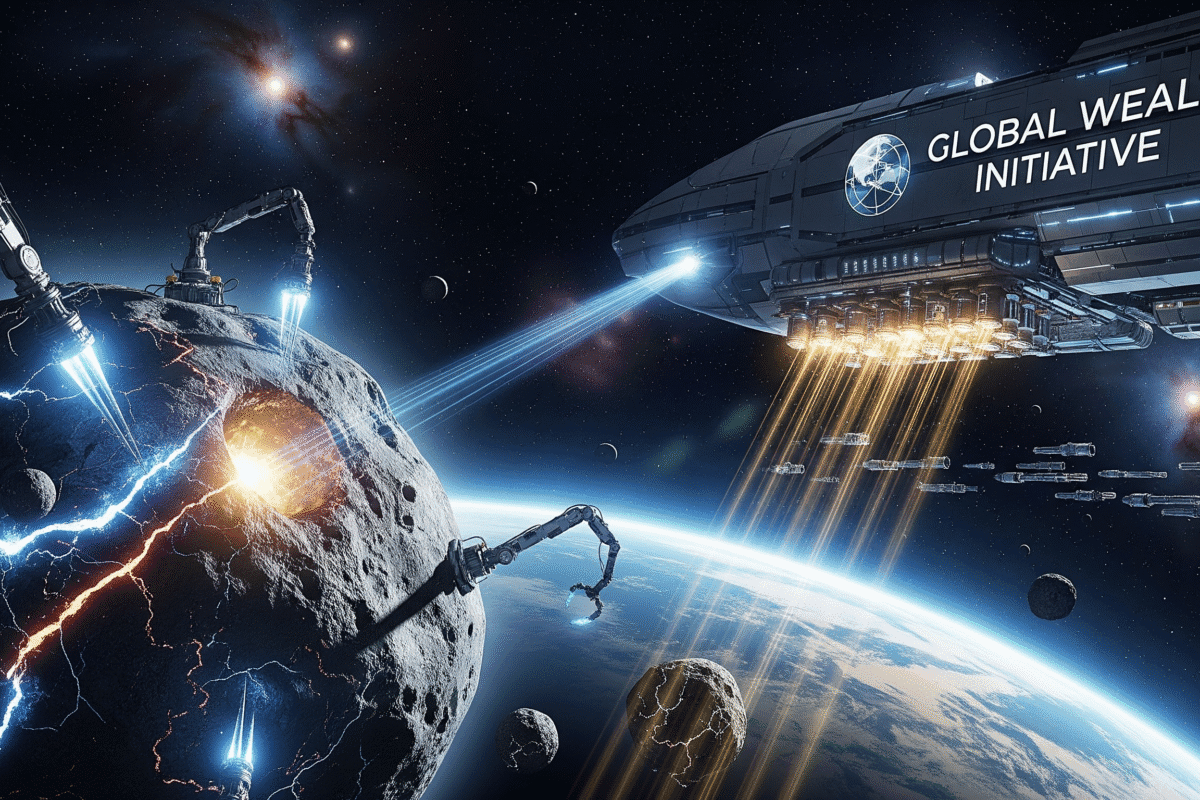How Space Mining Could Change Global Wealth?
How Space Mining Could Change Global Wealth?
Humanity has always looked up at the night sky with wonder. But now, those stars aren’t just symbols of mystery—they’re opportunities for unimaginable wealth. Space mining, the extraction of valuable minerals and resources from asteroids and other celestial bodies, could usher in a new era of economic revolution. Unlike the California Gold Rush of the 1800s or the oil booms of the 20th century, this new frontier could completely reshape the way wealth is distributed across the globe.
If realized, asteroid mining could unlock access to trillions—perhaps quadrillions—of dollars’ worth of rare metals. Platinum, gold, nickel, and rare earth elements essential for smartphones, electric vehicles, and green technologies are believed to exist in massive quantities beyond Earth. The impact on global markets, industries, and even geopolitics would be profound.
HSBC Cashback Credit Card 2025 – Benefits, Rewards & How to Apply?

Why Space Mining Matters: Scarcity on Earth vs. Abundance in Space
On Earth, resources are limited. Nations compete fiercely for access to oil, gas, rare earth elements, and industrial metals. Supply chain disruptions, environmental damage, and geopolitical tensions often revolve around resource scarcity.
But in space, abundance is the rule. A single metallic asteroid could contain more platinum than has ever been mined in human history. According to NASA, the asteroid 16 Psyche, located in the asteroid belt between Mars and Jupiter, could contain metals worth $10 quintillion—a figure so large it could collapse the concept of money as we know it.
- Platinum-group metals (PGMs): Essential for clean energy tech, catalytic converters, and electronics.
- Nickel and Iron: Industrial backbones for construction and manufacturing.
- Rare Earth Elements (REEs): Used in wind turbines, electric vehicles, and defense technology.
- Water Ice: Crucial for sustaining space colonies and producing rocket fuel.
The leap from scarcity to abundance could transform industries overnight, ending dependence on Earth’s limited reserves.
The Economic Impact: Who Gets Rich and Who Loses Out
Space mining could create a trillion-dollar industry, but not everyone will benefit equally. Let’s break down potential winners and losers:
Winners:
- Private Space Companies: SpaceX (Elon Musk), Blue Origin (Jeff Bezos), and Planetary Resources are positioning themselves to exploit asteroid wealth.
- Resource-Dependent Nations: Countries heavily reliant on imports of rare earth metals (like the U.S. and EU nations) could reduce dependency on China.
- Tech and Energy Industries: Cheaper access to critical materials would accelerate the transition to clean energy and advanced technologies.
Losers:
- Resource-Rich Nations on Earth: Countries whose economies depend on exporting minerals (like Chile for copper, South Africa for platinum, and China for rare earths) could see their markets collapse.
- Traditional Mining Companies: Terrestrial mining may become obsolete if space-derived materials flood the market.
- Global Commodity Markets: Prices could crash, destabilizing economies worldwide.
The global wealth map could be redrawn, shifting power from traditional resource giants to spacefaring nations and corporations.
Technology’s Function: Enabling the Impossible
Drilling on Earth is far easier than mining in space. It calls for advances in materials science, propulsion, robotics, and artificial intelligence. Important technological facilitators consist of:
- Autonomous mining robots are able to dig and remove materials in settings with zero gravity.
- 3D printing in space is the process of creating tools and shelters out of locally mined raw materials.
- Reusable Rockets: Large-scale missions are made possible by SpaceX’s Falcon 9 and Starship, which lower the cost of transportation.
- Space-Based Refueling Stations: Producing hydrogen-oxygen fuel from captured water ice.
As costs fall due to innovations in rocket technology and robotics, space mining is becoming less science fiction and more near-future reality.
Space Wealth Geopolitics: A New Space Race
Space resources could define the 21st and 22nd centuries, much like oil influenced the geopolitics of the 20th century. Nations are already positioning themselves for dominance.
- United States: Through NASA’s Artemis program and partnerships with private companies.
- China: Expanding rapidly with lunar missions and long-term asteroid mining ambitions.
- European Union: Building alliances with ESA (European Space Agency) initiatives.
- Russia & India: Investing in space exploration to secure a foothold in the coming resource race.
The Outer Space Treaty of 1967 prohibits any nation from claiming sovereignty over celestial bodies, but it doesn’t clearly regulate resource ownership. This legal gray area could trigger conflicts or push nations to establish new treaties that define who owns what in space.
Environmental Considerations: Mining Without Earthly Consequences
Traditional mining devastates ecosystems—destroying forests, polluting rivers, and displacing communities. Space mining offers a way to reduce humanity’s environmental footprint by sourcing materials from beyond Earth.
However, challenges remain:
- Space debris from mining operations could worsen orbital pollution.
- Mining asteroids could disrupt their orbits, posing risks to Earth.
- Ethical questions about exploiting other worlds for profit are already emerging.
Still, many argue that moving resource extraction off-planet is the only sustainable path for a growing civilization.
The Future of Wealth Distribution: Will Space Mining Make Us All Rich?
In theory, if trillions of dollars in metals suddenly became available, humanity could enter a post-scarcity economy. But history suggests otherwise. Wealth often consolidates in the hands of those with power and technology.
Some scenarios:
- Corporate Monopoly: Private companies dominate space mining, creating trillionaire space barons.
- Global Cooperation: Nations establish international frameworks to share wealth, similar to Antarctica treaties.
- Inequality Explosion: Wealth gaps widen dramatically, with only a few entities benefiting from cosmic riches.
Which future we get depends on governance, regulation, and how humanity chooses to manage this new frontier.
Timeline: Could Mining in Space Start?
Even though extensive mining may not occur for decades, the following actions are already being taken:
- 2020s: Robotic prospecting missions (the launch of NASA’s Psyche mission is planned).
- 2030s: Test mining activities on asteroids close to Earth.
- 2040s–2050s: Economic integration, space-based manufacturing, and mining on a commercial scale.
Space mining may become a vital component of the world economy by the end of the twenty-first century.
Conclusion: The Cosmos’ Wealth Is Awaiting
Mining in space is important for the future of society, not just for metals. It promises to change the definition of wealth, transform economies, and redistribute wealth. Even while there are still issues with technology, ethics, and the law, the direction is clear: humanity is moving toward a time when the stars will be mined rather than used only for fantasy.
The next great resource race will occur in the silent, limitless reaches of space rather than in deserts, seas, or rainforests. And if the riches of the universe is distributed sensibly, then not only countries or businesses but all of humanity may benefit.
The Role of Financial Advisors for Entrepreneurs: Key to Business Growth and Stability
The Role of Financial Advisors for Entrepreneurs: Key to Business Growth and Stability
